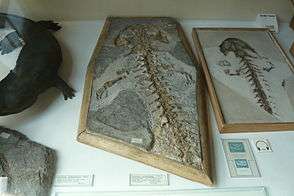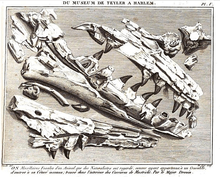Teylers Fossil Room II

Fossil room II
The Fossil room II is one of two paleontological display rooms in Teylers Museum. The Fossil room II was built in 1885 as an extension of the first Fossil room I, under the direction of the architect Ad van der Steur Jr..[1]
History
The Teylers Museum was originally opened in 1784 as a museum of science and arts. During the course of the next few decades the number of natural history objects grew, and under J.G.S. van Breda the Paleontological collection grew with the purchase of various collections based on his in-depth knowledge and personal network. Tiberius Winkler began the task of cataloguing, and was thus able to sort the collection into more or less important objects, and to display these, the idea of a new museum slowly gained ground with the directors.
Cabinet 1 with salamander and tortoise holotypes
Swiss naturalist
Johann Jakob Scheuchzer's
Homo diluvii testis in 1726
The
Andrias scheuchzeri holotype from
Oeningen Miocene, where the extra uncovering of arms was done by
Georges Cuvier Cabinet 2 with fish fossils, the personal specialty of Winkler
Cabinet 3
Cabinet 4 with fish
Cabinet 5
Cabinet 6 with
nautilus shells
Cabinet 7
Cabinet 8
Cabinet 8 - detail with long fossil
Cabinet 9
Cabinet 10 with Lügensteine and insects in amber
Cabinet 11
Cabinet 12
Cabinet 13
Cabinet 14
Cabinet 15
Cabinet 16
Cabinet 17 with objects from the
JuraCabinet 18
Cabinet 19
Cabinet 20 with
GomphotheriumGomphotherium, Mioceen,
Oeningen - identified by
Georges CuvierThe Teylers
mosasaurus as published by
Faujas de Saint-Fond in 1799
The Haarlem mosasaurus in its original cabinet
The central (low) cabinet houses the remains of the
Petrus Camper collection, such as
puppigerus
References
Further reading
- Teyler 1778-1978. Studies en bijdragen over Teylers Stichting naar aanleiding van het tweede eeuwfeest, Haarlem & Antwerp, 1978.
External links
.svg.png)

 Cabinet 1 with salamander and tortoise holotypes
Cabinet 1 with salamander and tortoise holotypes Swiss naturalist Johann Jakob Scheuchzer's Homo diluvii testis in 1726
Swiss naturalist Johann Jakob Scheuchzer's Homo diluvii testis in 1726 The Andrias scheuchzeri holotype from Oeningen Miocene, where the extra uncovering of arms was done by Georges Cuvier
The Andrias scheuchzeri holotype from Oeningen Miocene, where the extra uncovering of arms was done by Georges Cuvier Cabinet 2 with fish fossils, the personal specialty of Winkler
Cabinet 2 with fish fossils, the personal specialty of Winkler Cabinet 3
Cabinet 3 Cabinet 4 with fish
Cabinet 4 with fish Cabinet 5
Cabinet 5 Cabinet 7
Cabinet 7 Cabinet 8
Cabinet 8 Cabinet 8 - detail with long fossil
Cabinet 8 - detail with long fossil Cabinet 9
Cabinet 9 Cabinet 10 with Lügensteine and insects in amber
Cabinet 10 with Lügensteine and insects in amber Cabinet 11
Cabinet 11 Cabinet 12
Cabinet 12 Cabinet 13
Cabinet 13 Cabinet 14
Cabinet 14 Cabinet 15
Cabinet 15 Cabinet 16
Cabinet 16 Cabinet 17 with objects from the Jura
Cabinet 17 with objects from the Jura Cabinet 18
Cabinet 18 Cabinet 19
Cabinet 19 Cabinet 20 with Gomphotherium
Cabinet 20 with Gomphotherium Gomphotherium, Mioceen, Oeningen - identified by Georges Cuvier
Gomphotherium, Mioceen, Oeningen - identified by Georges Cuvier The Teylers mosasaurus as published by Faujas de Saint-Fond in 1799
The Teylers mosasaurus as published by Faujas de Saint-Fond in 1799